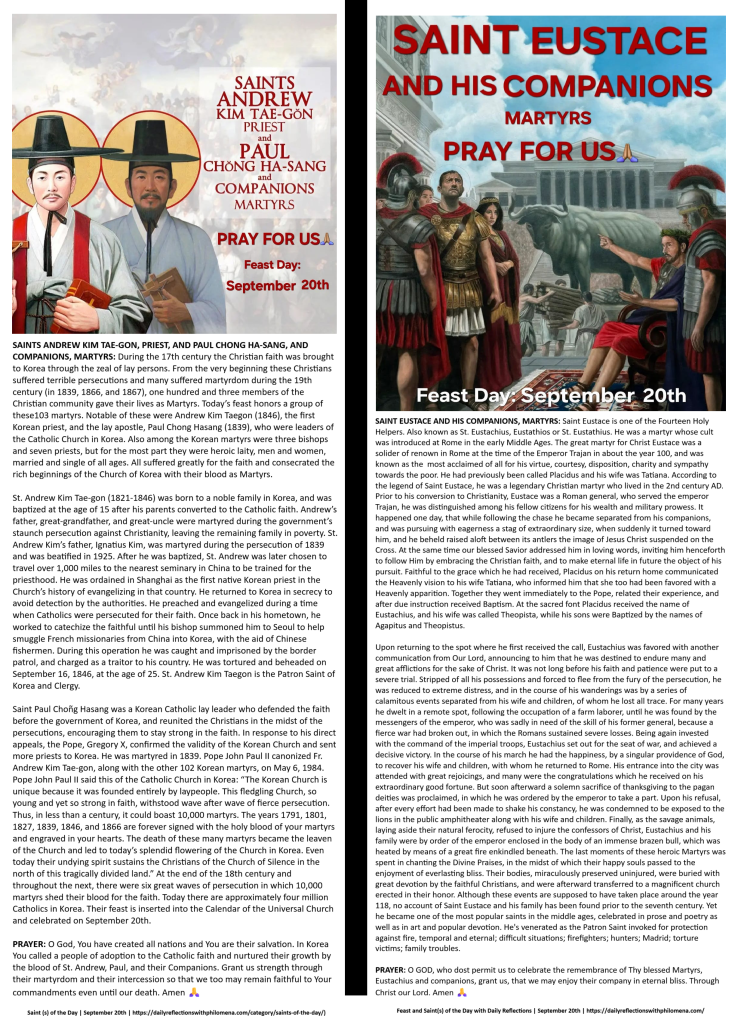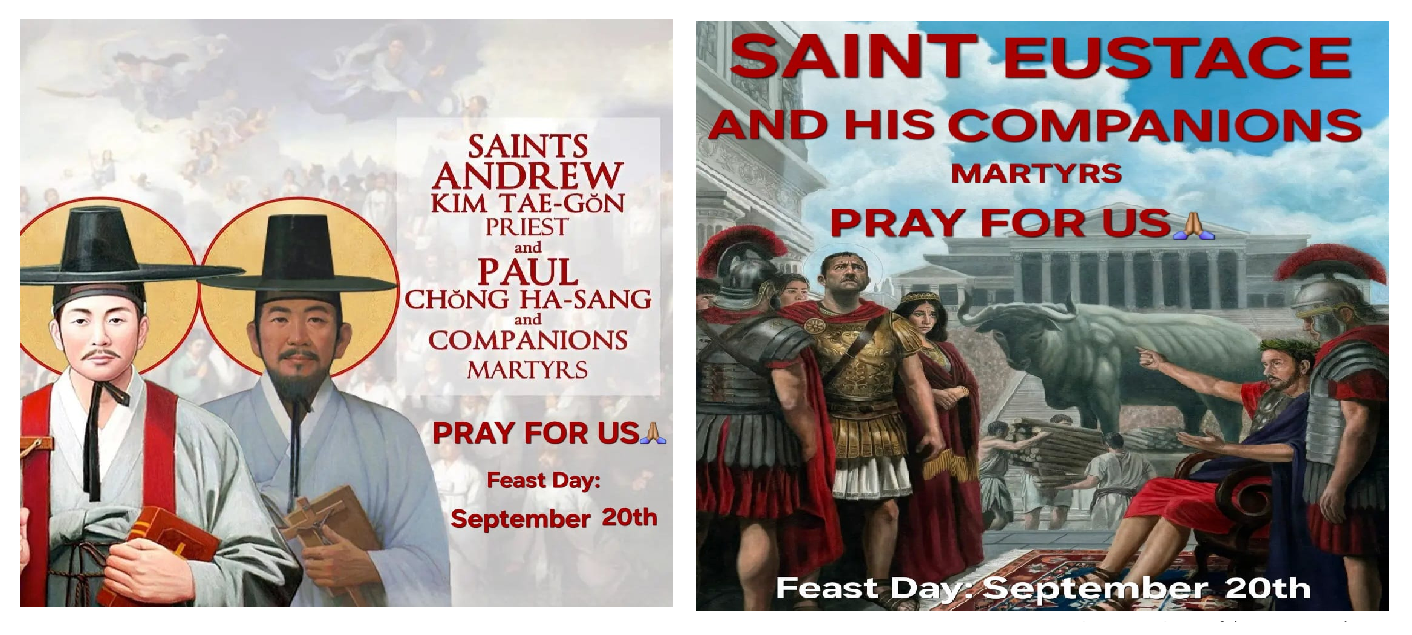
MEMORIAL OF SAINTS ANDREW KIM TAE-GÕN, PRIEST, AND PAUL CHÕNG HA-SANG, AND COMPANIONS, MARTYRS AND SAINT EUSTACE AND HIS COMPANIONS, MARTYRS: Today, we celebrate the Memorial of Saints Andrew Kim Tae-gŏn, Priest, and Paul Chŏng Ha-sang, and Companions, Martyrs and Saint Eustace and His Companions, Martyrs. Through the intercession of our Blessed Mother Mary and the Saints on this feast day, we humbly pray for the safety and well-being of all firefighters, for protection against fire. We pray for torture victims and difficult situations. We pray for the sick and dying, especially those who are mentally and physically ill, and those suffering from cancers and other terminal diseases. We pray for the souls in Purgatory and the repose of the souls of the faithful departed. We pray for all widows and widowers. We pray for the poor and needy, for peace, love, and unity in our marriages, our families and our world. And we continue to pray for our Holy Father, the Bishops, the Clergy, for vocations to the priesthood and religious life, for the Church, for persecuted christians, for the conversion of sinners, and Christians all over the world…. Amen🙏
SAINTS ANDREW KIM TAE-GON, PRIEST, AND PAUL CHONG HA-SANG, AND COMPANIONS, MARTYRS: During the 17th century the Christian faith was brought to Korea through the zeal of lay persons. From the very beginning these Christians suffered terrible persecutions and many suffered martyrdom during the 19th century (in 1839, 1866, and 1867), one hundred and three members of the Christian community gave their lives as Martyrs. Today’s feast honors a group of these103 martyrs. Notable of these were Andrew Kim Taegon (1846), the first Korean priest, and the lay apostle, Paul Chong Hasang (1839), who were leaders of the Catholic Church in Korea. Also among the Korean martyrs were three bishops and seven priests, but for the most part they were heroic laity, men and women, married and single of all ages. All suffered greatly for the faith and consecrated the rich beginnings of the Church of Korea with their blood as Martyrs.
St. Andrew Kim Tae-gon (1821-1846) was born to a noble family in Korea, and was baptized at the age of 15 after his parents converted to the Catholic faith. Andrew’s father, great-grandfather, and great-uncle were martyred during the government’s staunch persecution against Christianity, leaving the remaining family in poverty. St. Andrew Kim’s father, Ignatius Kim, was martyred during the persecution of 1839 and was beatified in 1925. After he was baptized, St. Andrew was later chosen to travel over 1,000 miles to the nearest seminary in China to be trained for the priesthood. He was ordained in Shanghai as the first native Korean priest in the Church’s history of evangelizing in that country. He returned to Korea in secrecy to avoid detection by the authorities. He preached and evangelized during a time when Catholics were persecuted for their faith. Once back in his hometown, he worked to catechize the faithful until his bishop summoned him to Seoul to help smuggle French missionaries from China into Korea, with the aid of Chinese fishermen. During this operation he was caught and imprisoned by the border patrol, and charged as a traitor to his country. He was tortured and beheaded on September 16, 1846, at the age of 25. St. Andrew Kim Taegon is the Patron Saint of Korea and Clergy.
Saint Paul Choñg Hasang was a Korean Catholic lay leader who defended the faith before the government of Korea, and reunited the Christians in the midst of the persecutions, encouraging them to stay strong in the faith. In response to his direct appeals, the Pope, Gregory X, confirmed the validity of the Korean Church and sent more priests to Korea. He was martyred in 1839. Pope John Paul II canonized Fr. Andrew Kim Tae-gon, along with the other 102 Korean martyrs, on May 6, 1984. Pope John Paul II said this of the Catholic Church in Korea: “The Korean Church is unique because it was founded entirely by laypeople. This fledgling Church, so young and yet so strong in faith, withstood wave after wave of fierce persecution. Thus, in less than a century, it could boast 10,000 martyrs. The years 1791, 1801, 1827, 1839, 1846, and 1866 are forever signed with the holy blood of your martyrs and engraved in your hearts. The death of these many martyrs became the leaven of the Church and led to today’s splendid flowering of the Church in Korea. Even today their undying spirit sustains the Christians of the Church of Silence in the north of this tragically divided land.” At the end of the 18th century and throughout the next, there were six great waves of persecution in which 10,000 martyrs shed their blood for the faith. Today there are approximately four million Catholics in Korea. Their feast is inserted into the Calendar of the Universal Church and celebrated on September 20th.
PRAYER: O God, You have created all nations and You are their salvation. In Korea You called a people of adoption to the Catholic faith and nurtured their growth by the blood of St. Andrew, Paul, and their Companions. Grant us strength through their martyrdom and their intercession so that we too may remain faithful to Your commandments even until our death. Amen 🙏
SAINT EUSTACE AND HIS COMPANIONS, MARTYRS: Saint Eustace is one of the Fourteen Holy Helpers. Also known as St. Eustachius, Eustathios or St. Eustathius. He was a martyr whose cult was introduced at Rome in the early Middle Ages. The great martyr for Christ Eustace was a solider of renown in Rome at the time of the Emperor Trajan in about the year 100, and was known as the most acclaimed of all for his virtue, courtesy, disposition, charity and sympathy towards the poor. He had previously been called Placidus and his wife was Tatiana. According to the legend of Saint Eustace, he was a legendary Christian martyr who lived in the 2nd century AD. Prior to his conversion to Christianity, Eustace was a Roman general, who served the emperor Trajan, he was distinguished among his fellow citizens for his wealth and military prowess. It happened one day, that while following the chase he became separated from his companions, and was pursuing with eagerness a stag of extraordinary size, when suddenly it turned toward him, and he beheld raised aloft between its antlers the image of Jesus Christ suspended on the Cross. At the same time our blessed Savior addressed him in loving words, inviting him henceforth to follow Him by embracing the Christian faith, and to make eternal life in future the object of his pursuit. Faithful to the grace which he had received, Placidus on his return home communicated the Heavenly vision to his wife Tatiana, who informed him that she too had been favored with a Heavenly apparition. Together they went immediately to the Pope, related their experience, and after due instruction received Baptism. At the sacred font Placidus received the name of Eustachius, and his wife was called Theopista, while his sons were Baptized by the names of Agapitus and Theopistus.
Upon returning to the spot where he first received the call, Eustachius was favored with another communication from Our Lord, announcing to him that he was destined to endure many and great afflictions for the sake of Christ. It was not long before his faith and patience were put to a severe trial. Stripped of all his possessions and forced to flee from the fury of the persecution, he was reduced to extreme distress, and in the course of his wanderings was by a series of calamitous events separated from his wife and children, of whom he lost all trace. For many years he dwelt in a remote spot, following the occupation of a farm laborer, until he was found by the messengers of the emperor, who was sadly in need of the skill of his former general, because a fierce war had broken out, in which the Romans sustained severe losses. Being again invested with the command of the imperial troops, Eustachius set out for the seat of war, and achieved a decisive victory. In the course of his march he had the happiness, by a singular providence of God, to recover his wife and children, with whom he returned to Rome. His entrance into the city was attended with great rejoicings, and many were the congratulations which he received on his extraordinary good fortune. But soon afterward a solemn sacrifice of thanksgiving to the pagan deities was proclaimed, in which he was ordered by the emperor to take a part. Upon his refusal, after every effort had been made to shake his constancy, he was condemned to be exposed to the lions in the public amphitheater along with his wife and children. Finally, as the savage animals, laying aside their natural ferocity, refused to injure the confessors of Christ, Eustachius and his family were by order of the emperor enclosed in the body of an immense brazen bull, which was heated by means of a great fire enkindled beneath. The last moments of these heroic Martyrs was spent in chanting the Divine Praises, in the midst of which their happy souls passed to the enjoyment of everlasting bliss. Their bodies, miraculously preserved uninjured, were buried with great devotion by the faithful Christians, and were afterward transferred to a magnificent church erected in their honor. Although these events are supposed to have taken place around the year 118, no account of Saint Eustace and his family has been found prior to the seventh century. Yet he became one of the most popular saints in the middle ages, celebrated in prose and poetry as well as in art and popular devotion. He’s venerated as the Patron Saint invoked for protection against fire, temporal and eternal; difficult situations; firefighters; hunters; Madrid; torture victims; family troubles.
PRAYER: O GOD, who dost permit us to celebrate the remembrance of Thy blessed Martyrs, Eustachius and companions, grant us, that we may enjoy their company in eternal bliss. Through Christ our Lord. Amen 🙏
